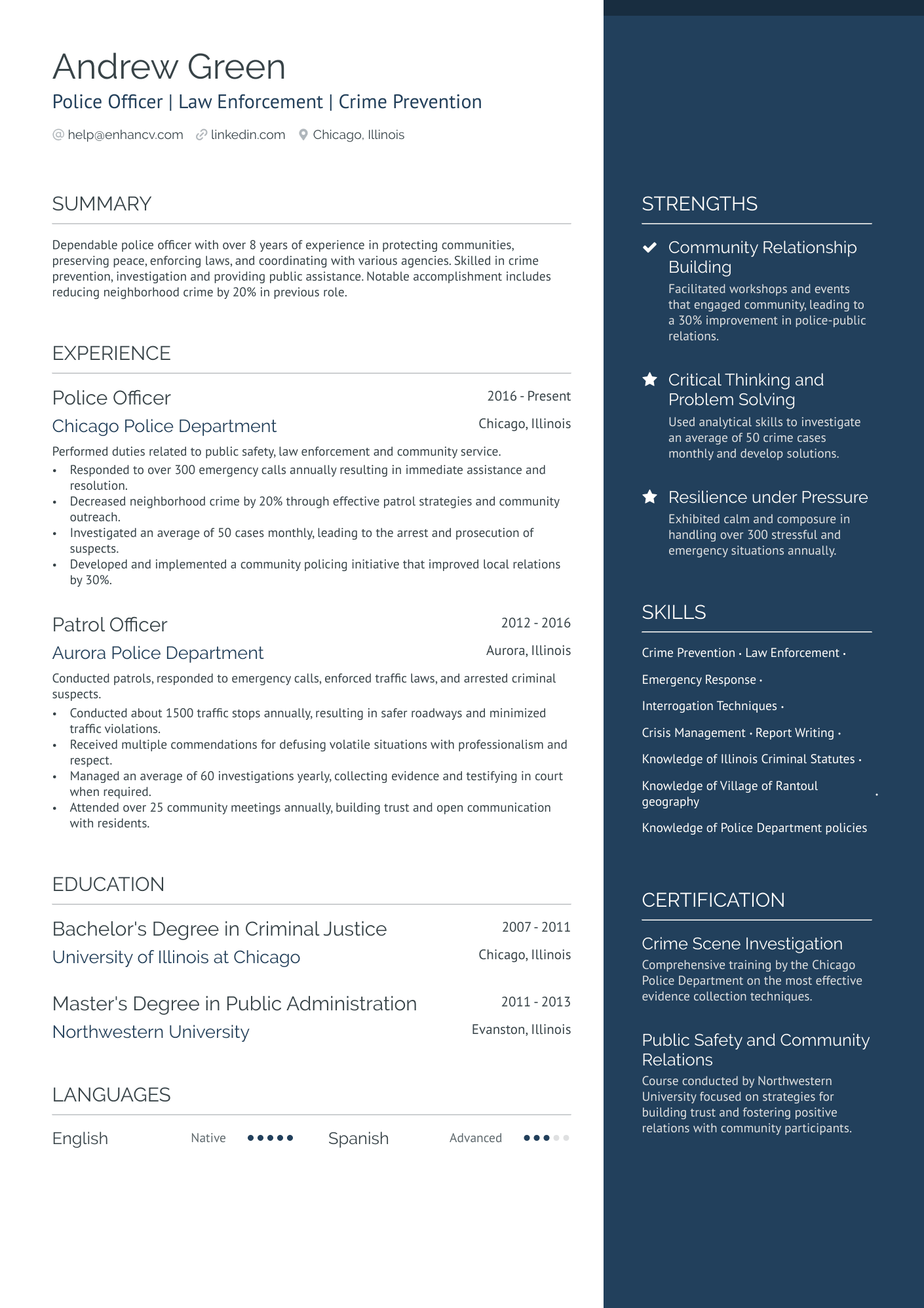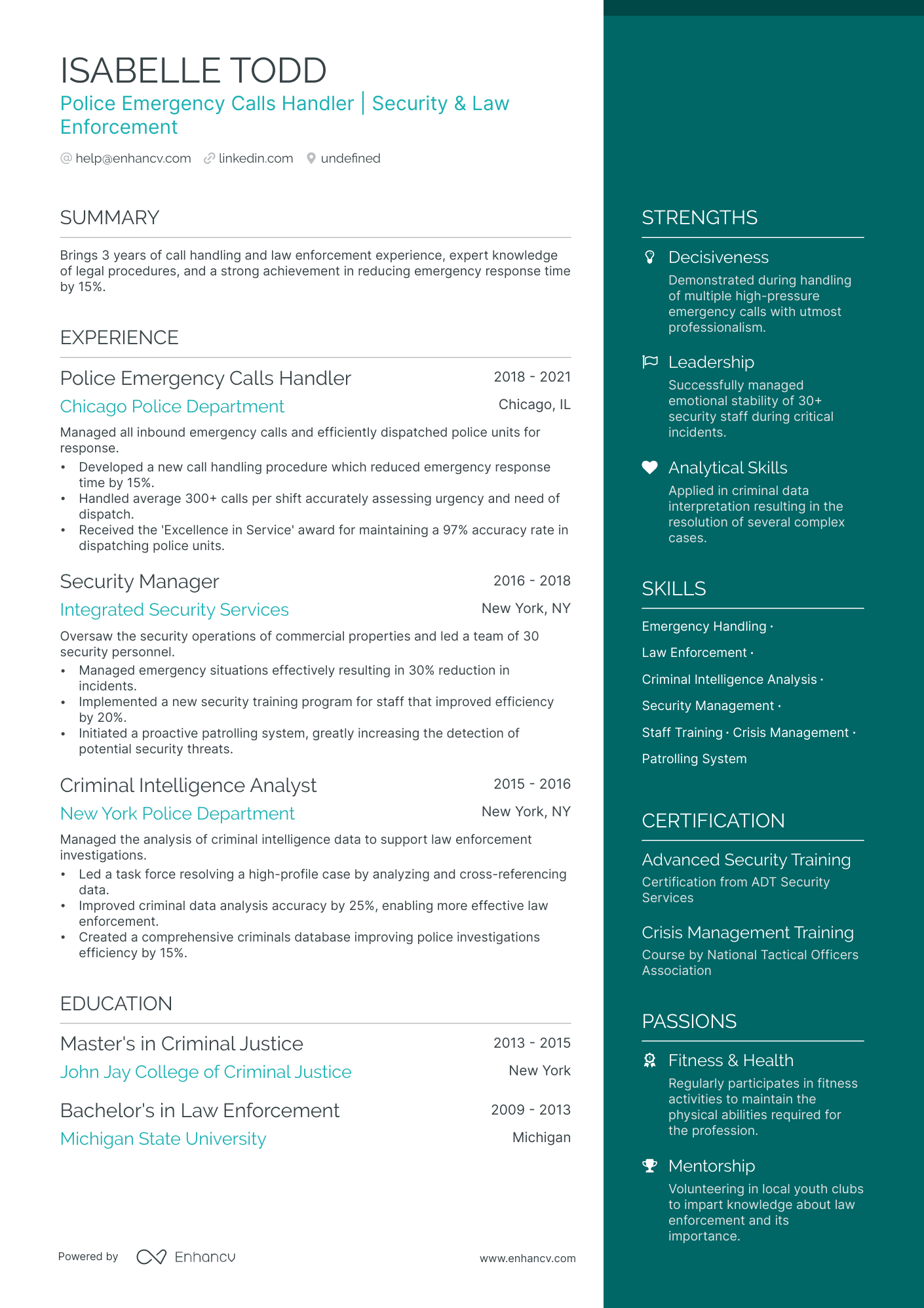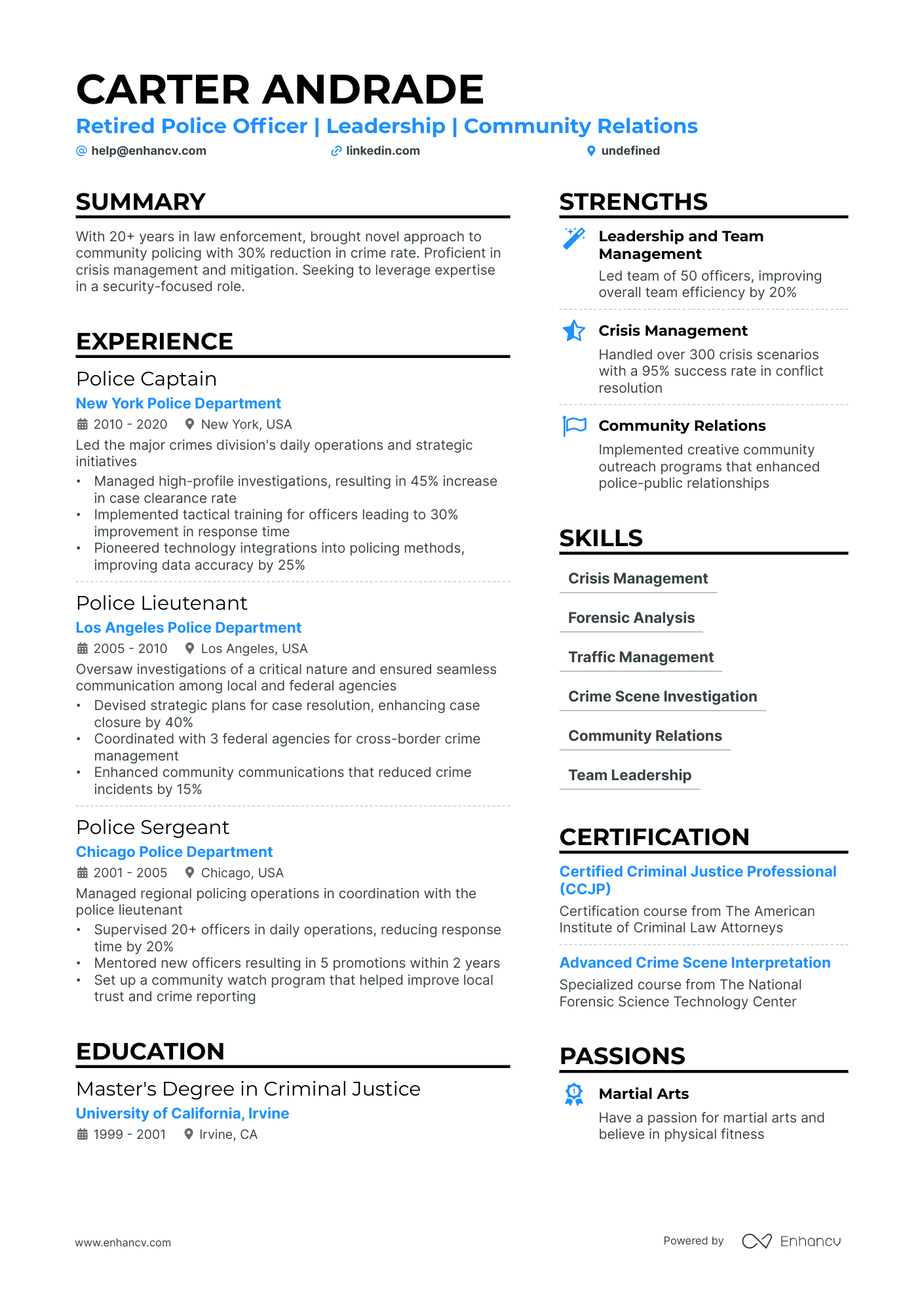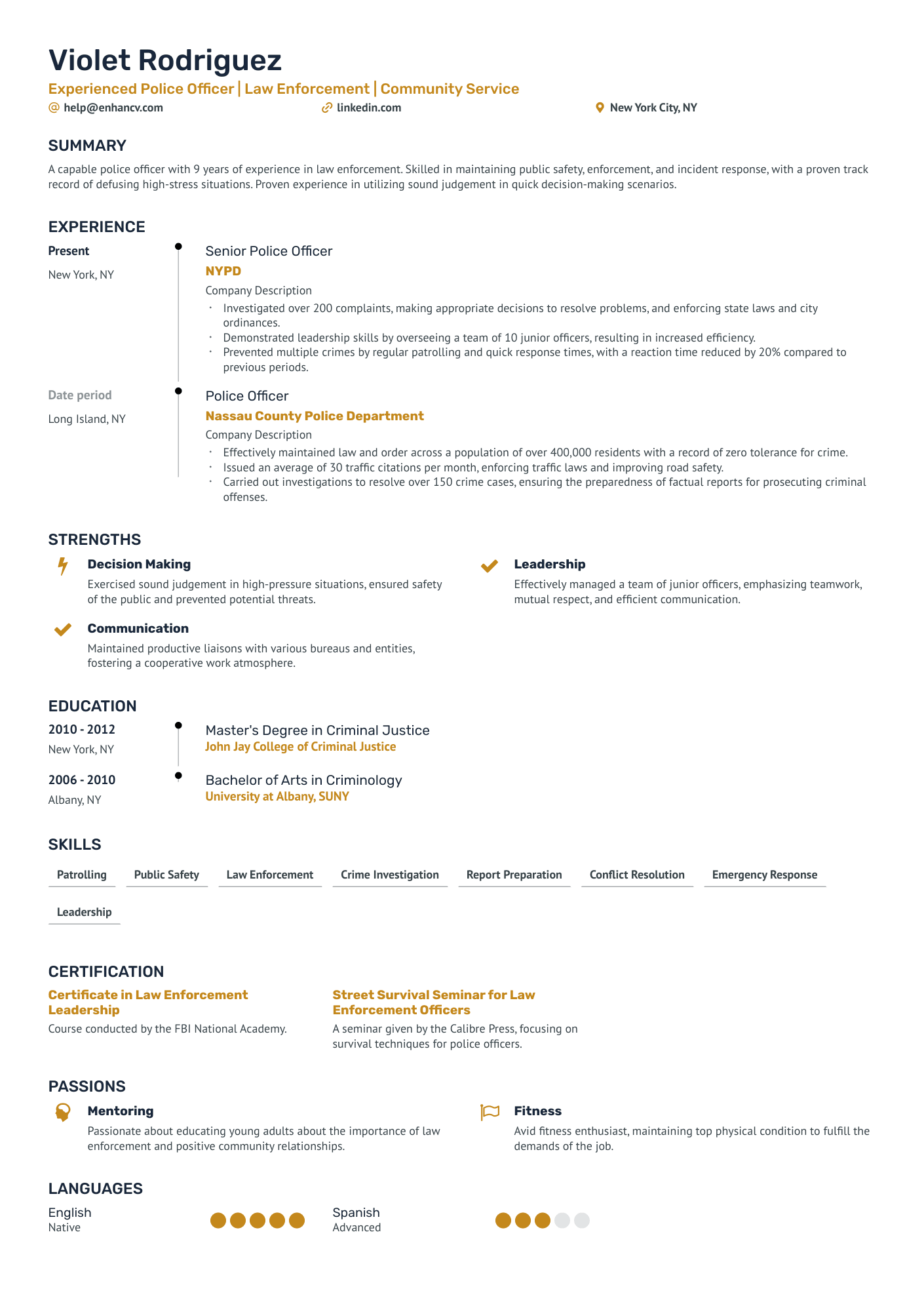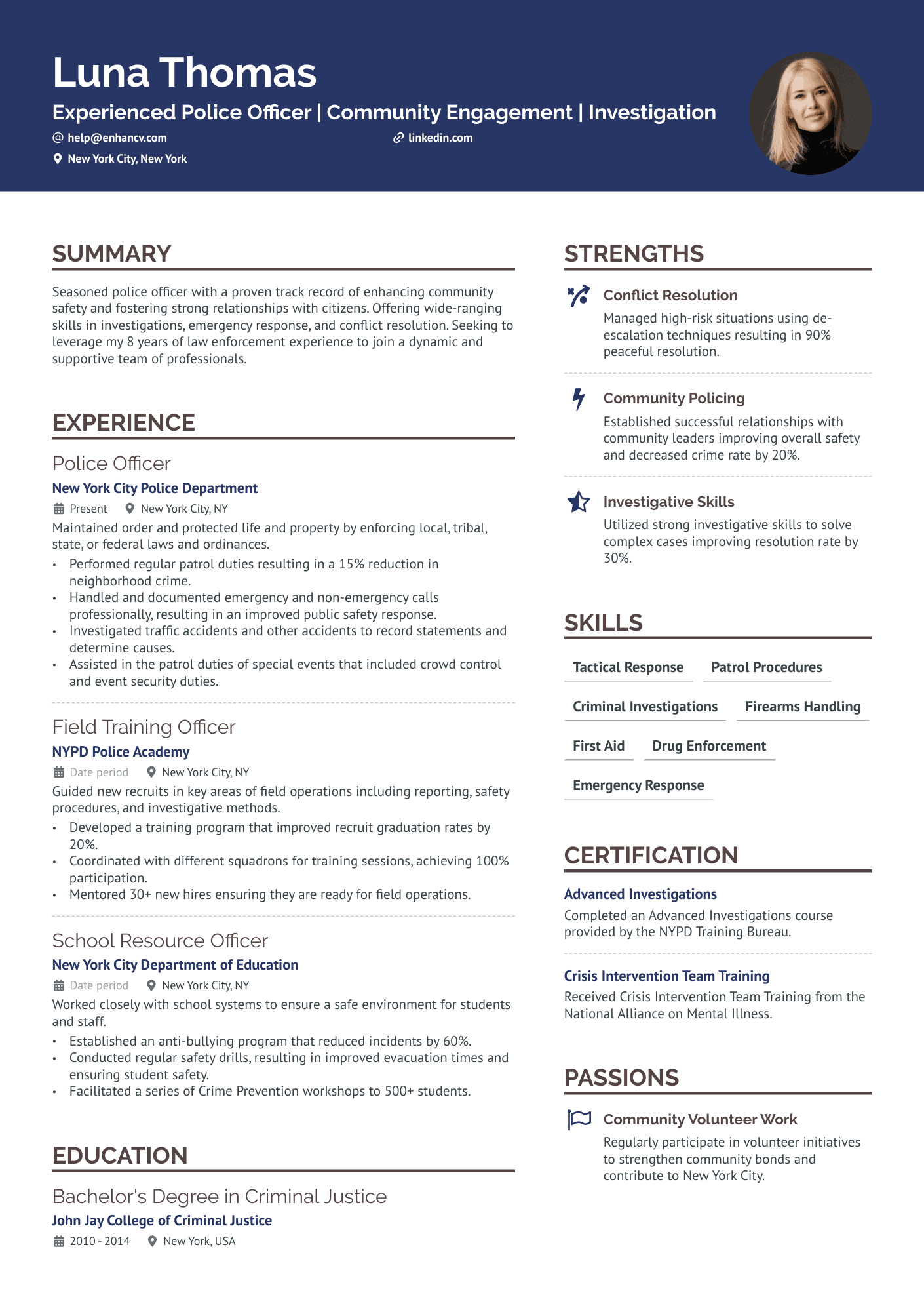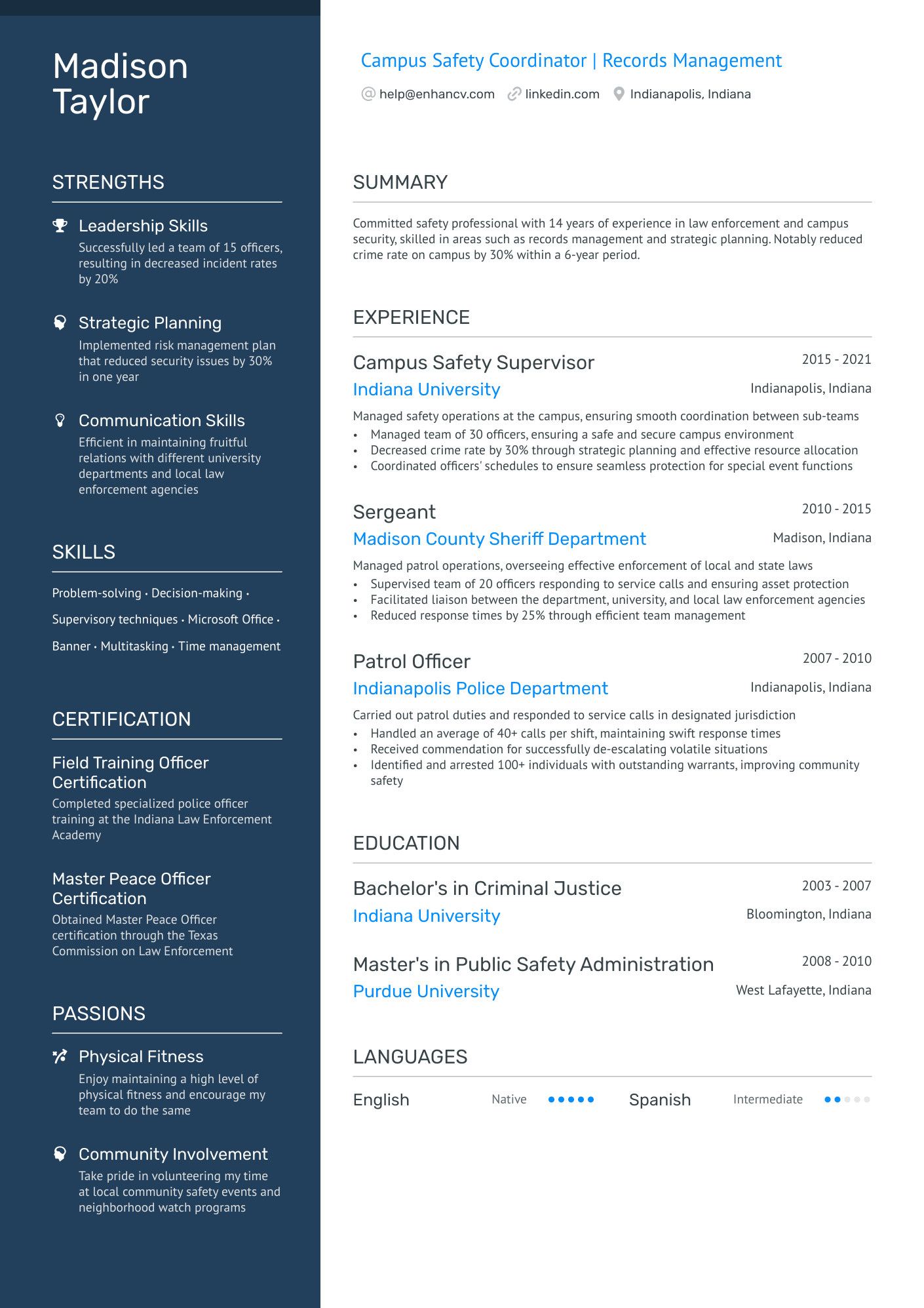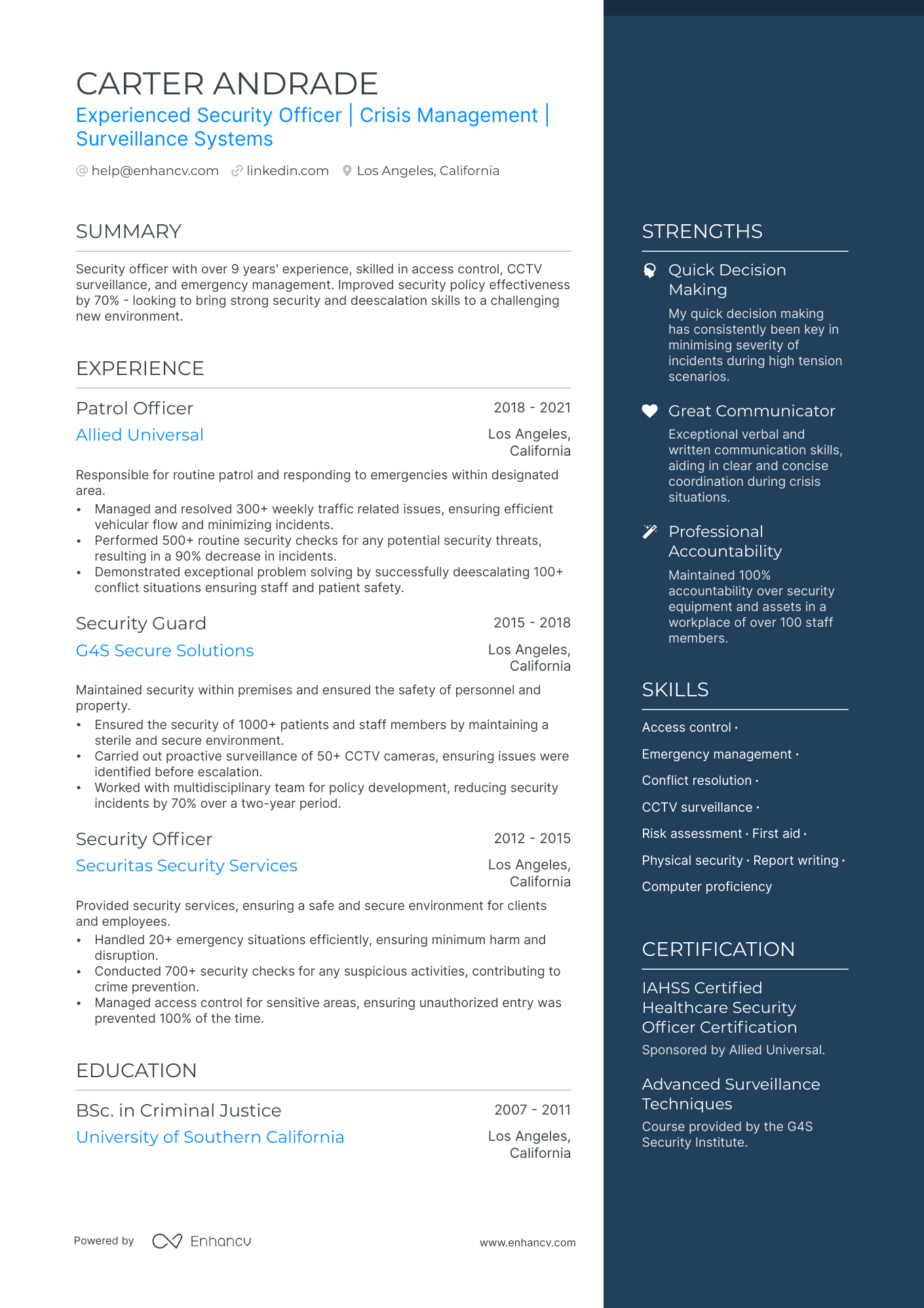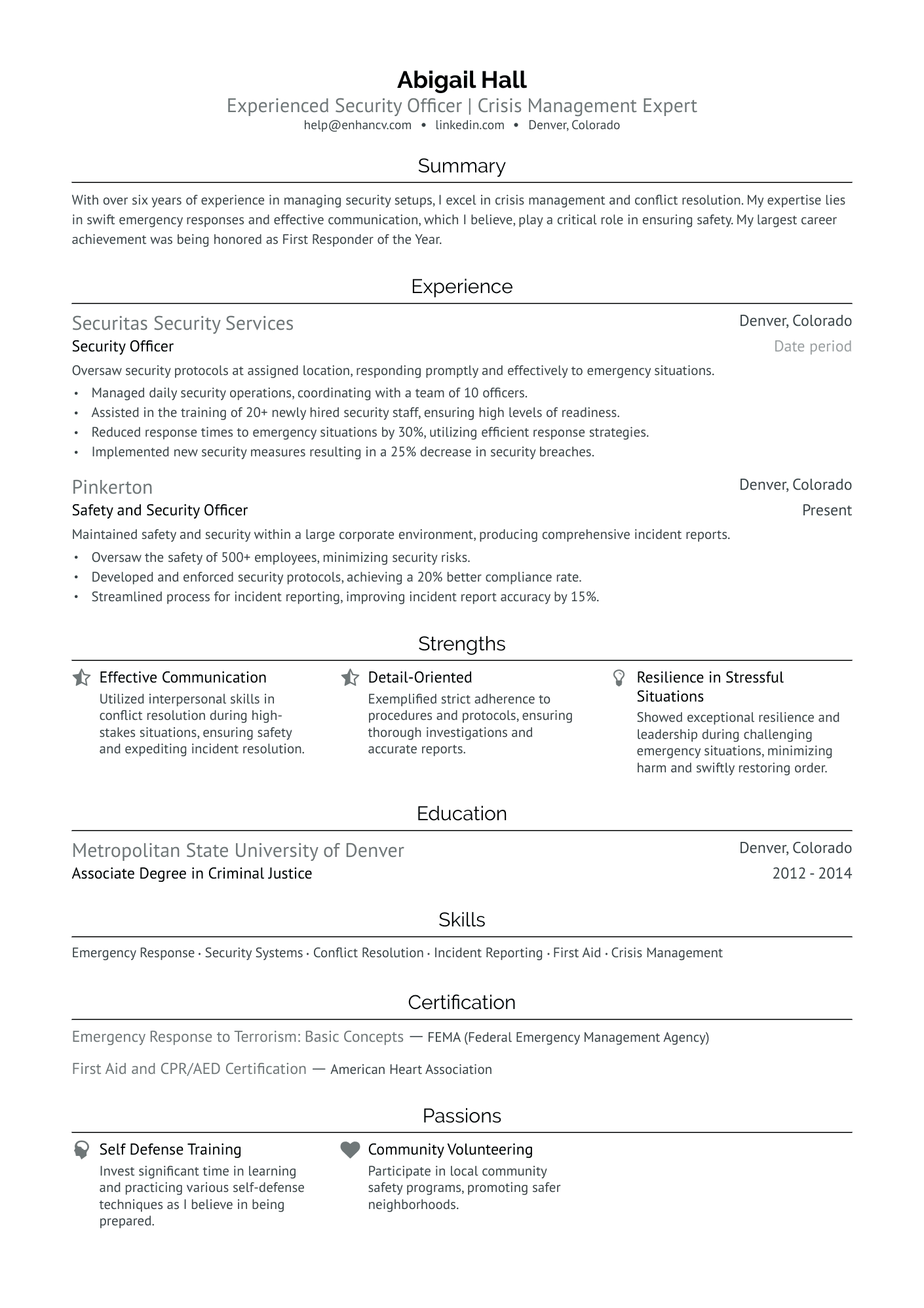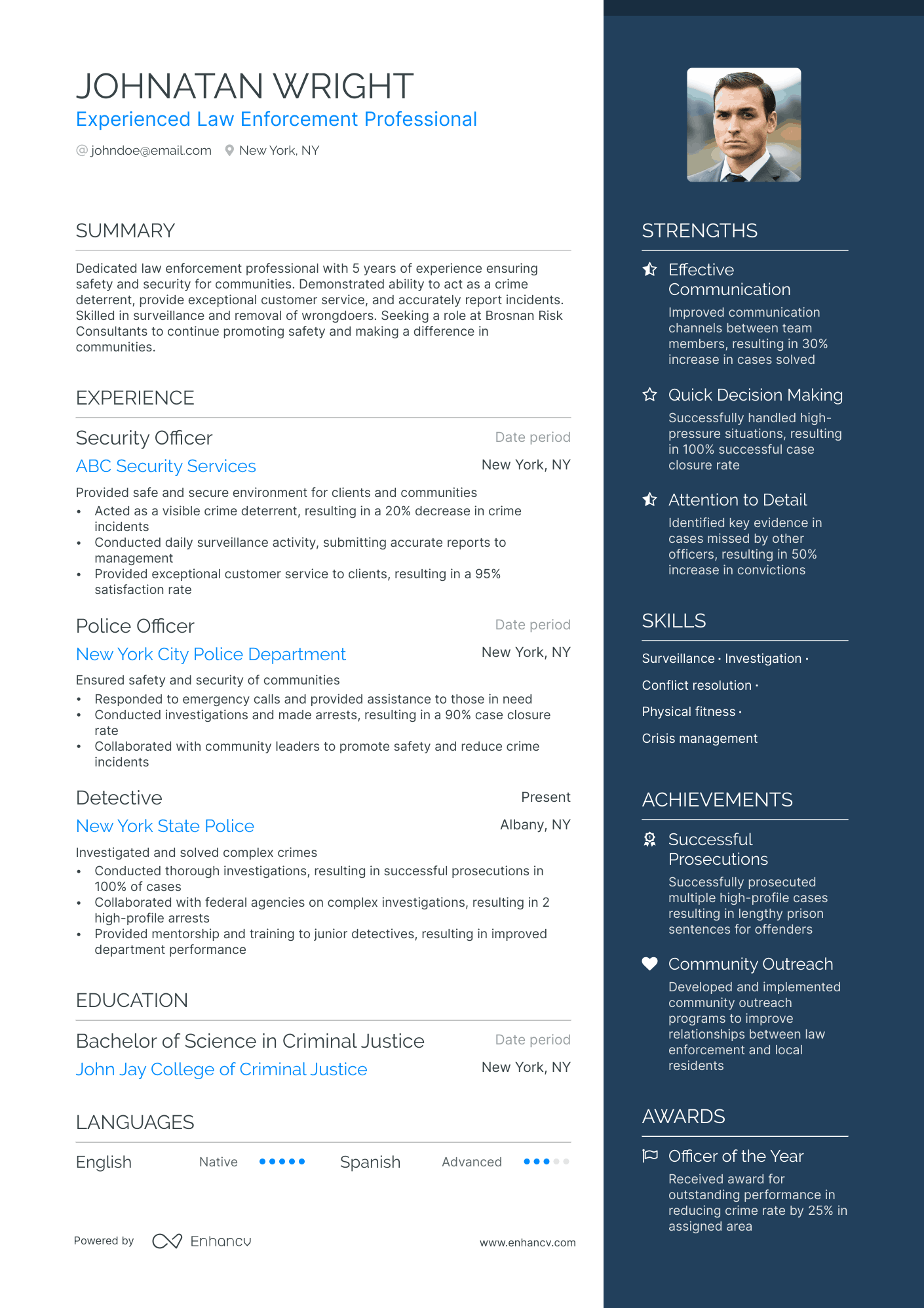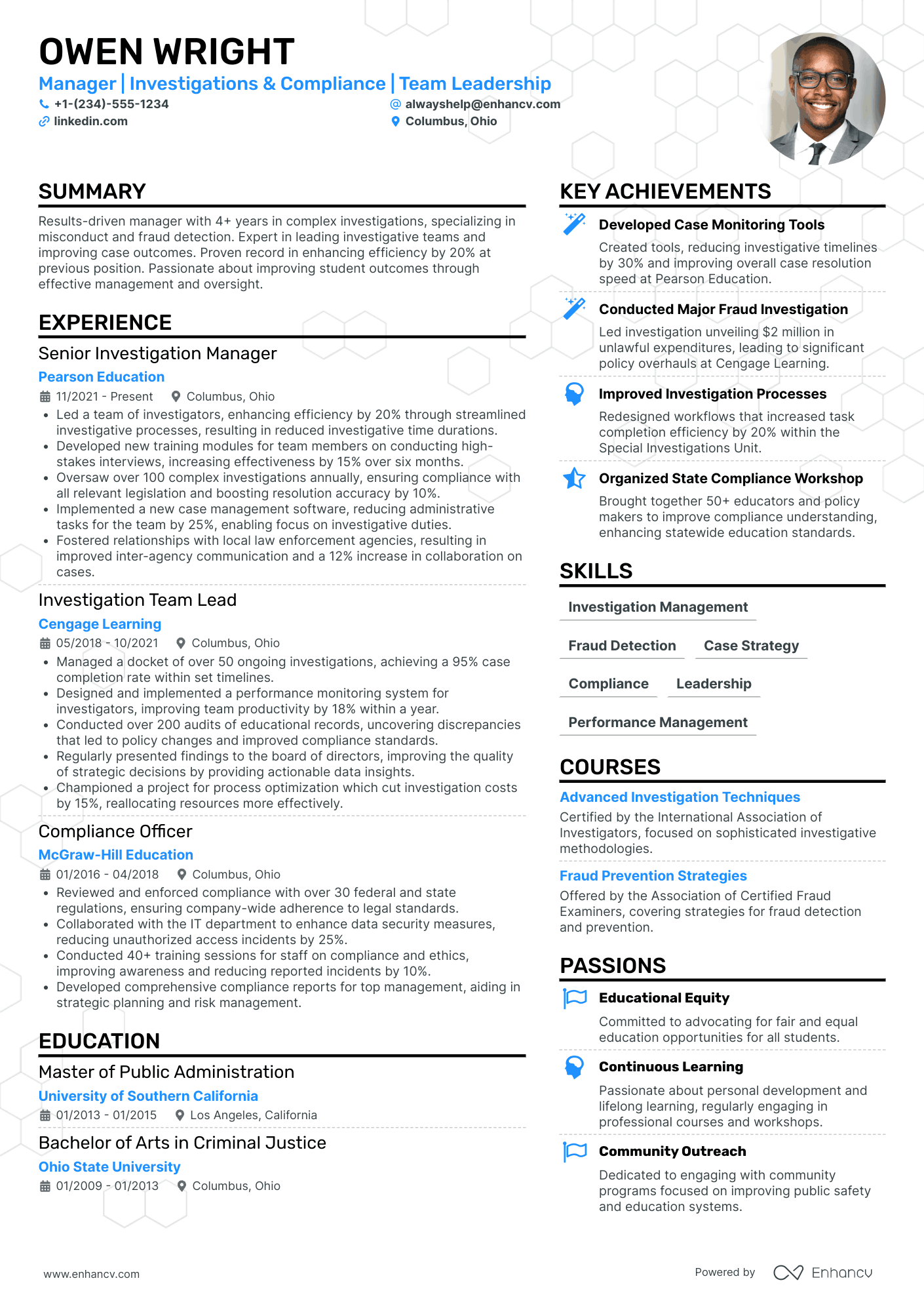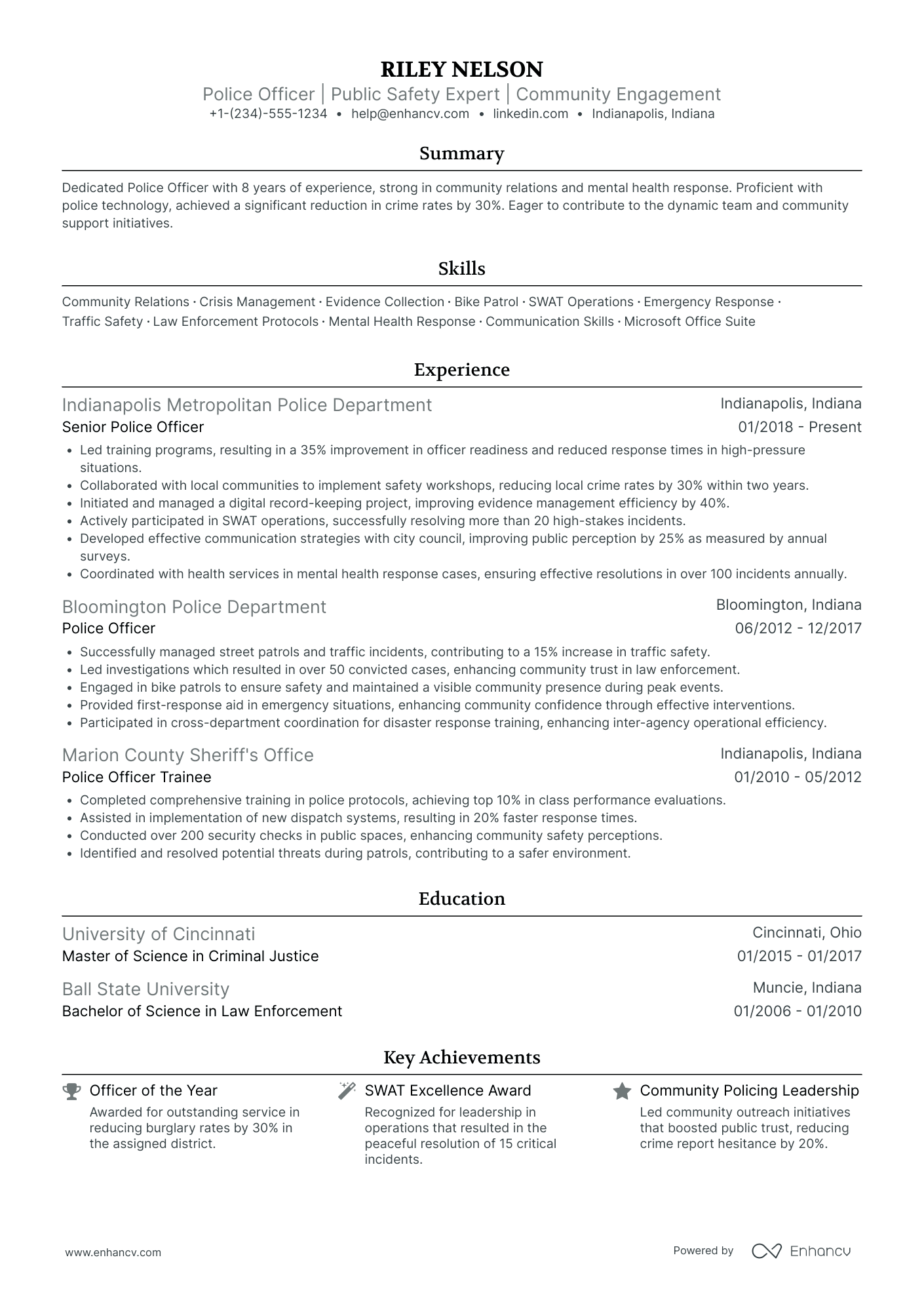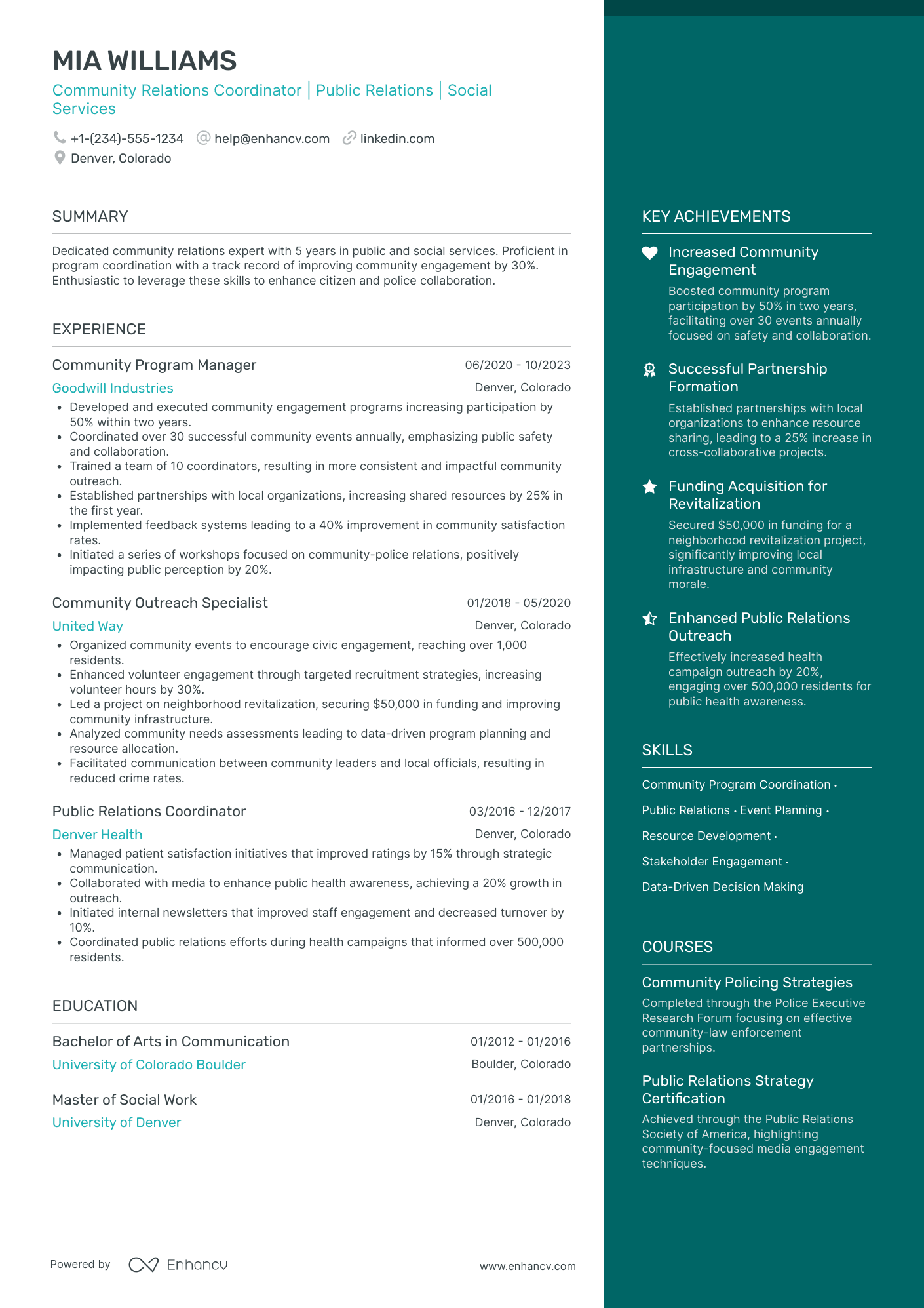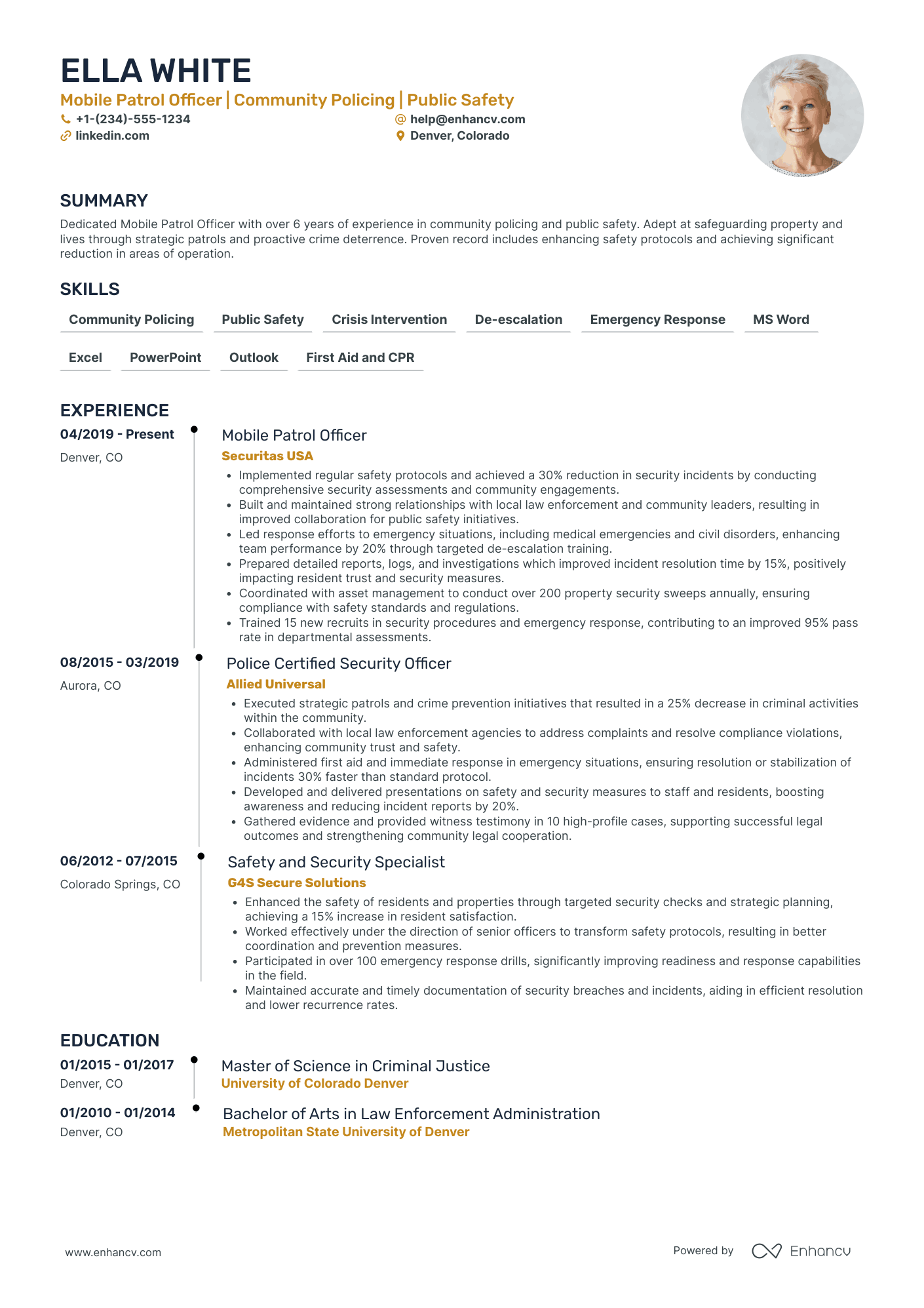Being a police officer is a childhood dream of the brave and adventurous. And lately, the job's been getting more popular. There will be 64,500 openings for police and detectives every year until 2032. This means you need a competitive police officer resume to outshine the competition. Working in law enforcement requires balancing your tough and gentle sides. You need to be ready for diverse situations and even foresee them. Think you need a hero? You can be your own—let the tips and tricks in our extensive guide be the special gadgets that help you stand out.
In this article, we’ll also cover:
- How to format a resume so it reflects you’re trustworthy and responsible
- Why balancing hard and soft skills is valuable in your job as a police officer
- What to include in your resume if you’re just starting out
- How to tailor your resume to a real-life police officer job description
- What are the most useful and practical certifications and trainings you can obtain and include in your resume for a stellar presentation
- How to refine your personal statement so that it catches recruiters’ attention
Check out our other resume samples and cover letter guides for careers in public safety.
- Law Enforcement Resume Example
- Firefighter Resume Example
- Investigator Resume Example
- Security Guard Resume Example
- Security Officer Resume Example
- Case Manager Resume Example
- Fraud Investigator Resume Example
- Incident Manager Resume Example
- Security Manager Resume Example
- Police officer Cover Letter Example
How to format a police officer resume
When we think of a policeman, the words role model come to mind. Stable, reliable, and dedicated. To mirror that in your police officer resume, a clear, presentable resume format is your best bet. But which one is best? Well, it depends on your experience and your goals. If you have an extensive police officer background, consider the classic reverse chronological resume. Your experience is your greatest asset, so outline the story of your career with this format. It’s also traditional, which works well with the expectations for the job.
But if you’re about to become one of the fresh recruits in the field, it’s better to opt for a functional resume. That way, you can lead with your skills and accomplishments. And compensate for the lack of experience.
Finally, if neither option aligns with your expectations, why not try a hybrid resume? It combines focusing on experience and your most valuable skills. Your police resume should be all about balance, and a combination resume best reflects that.
Formatting tips you can rely on
You can always count on the force to save the day, and you can also count on these tips:
- Resume length: For most cases, a 1-page focused resume is enough—but use 2 if you have extensive experience. Consider using a 2-column format to save space. And yes, a 2-column resume performs equally well in terms of ATS (Applicant Tracking Systems) score.
- Design components: You might think that colors look unprofessional or inappropriate in a police resume. In fact, using a subtle color palette can make your resume stand out. It can also direct attention to your strengths. Use classic fonts like Lato or Rubik to achieve an even more polished look.
- Header, contact info, and photo: Make your contact information easily accessible. Usually, photos aren’t required for a police officer resume. Let your experience and achievements be the image of your professionalism.
- Proofread your resume: This ensures accuracy and competence. Reflect your attention to detail and reliability, critical traits for a police officer.
Use our fab ATS checker to make sure your resume has flawless grammar and spelling!
Consider the local standards – Canadian resumes, for example, may have a different format.
Here are some resume sections you don’t want to miss in your police resume:
The top sections on a police resume:
- Job objective section: This section is essential because it allows you to summarize your career goals and explain why you would be an excellent fit for the police officer position.
- Skills section: By providing a list of your specific skills related to law enforcement, you show your capacity and display qualities that make you suitable for the job.
- Work experience section: This highlights your law enforcement experiences and duties you’ve performed, solidifying your ability to handle the role.
- Education and training section: This is necessary because it highlights any relevant education, training, or certifications, demonstrating your knowledge and readiness for the job.
- References section: Including such a section offers potential employers insight into your past performance and professional relationships, adding weight to your application.
Recruiters will be scanning each section of your resume for key details. Make sure to tailor your presentation to highlight these vital points.
What recruiters want to see on your resume:
- Field experience: Recruiters prioritize field experience because it proves your ability to handle real-life situations as a police officer.
- Specialized skills: Any specialized training or skills, such as knowledge of a foreign language or forensics, are highly valued because they can contribute to the variety of situations police officers encounter.
- Physical fitness: Physical fitness level is another point of interest for recruiters as the job of a police officer is often physically demanding.
- Integrity: Your level of integrity and moral character, often gauged from your records and references, are crucial because police officers are supposed to uphold the law in a fair and just manner.
- Communication skills: Good communication skills are necessary as police officers often have to interact with the public and other law enforcement officials, so they need to convey information clearly and effectively.
Good—we have the bases covered. You now have the outline of your resume. Let’s see how to go about the most important section on your resume: your experience.
How to write your police resume experience
Working as a police officer is as versatile as a job can get. You can spend one day bent at your desk writing reports and another—in the eye of an action scene. No two days are the same, which means your experience is unique, and your resume should reflect that. Don’t hesitate to put emphasis on your achievements. Surely, you have a few feats to be proud of!
When crafting your police officer resume experience section, keep in mind to:
- List relevant experience: Show your commitment to your work by including only positions related to your work in the force.
- Saturate with action verbs: Working as a police officer is mostly about action, so let your words accentuate your deeds. Use strong, powerful language. Really think about what sets you apart and show your personality!
- Be honest and accurate: Give truthful information that reflects your experience and accomplishments. Exaggerations or lies can be easily discovered during background checks.
Let's use the police officer job description below to create a resume experience entry that just works.
Job Title: Police officer
Company Introduction: Our company leads all public safety functions within the university, including police, security, and emergency management, and offers an integrated approach to safety and security, operating 24 hours a day, seven days a week, 365 days a year. The company combines Ann Arbor, Dearborn, and Flint operations to provide students, visitors, faculty, and staff with a safe and secure environment. Through our partnerships across the university and local, state, and federal law enforcement agencies, we use a blended service model to meet the needs of our community and exceed expectations.
We employ those who actively embrace and uphold our values of respecting differences, promoting equitable practices, and fostering intentional inclusion. This means creating an environment where everyone in our community feels valued, welcomed, and safe. We prize proactive engagement with our community and provide compassionate and professional service to enhance the quality of life for all.
Job Description: As a Police Officer, you will provide for public safety by maintaining order, responding to emergencies, protecting people and property, promoting good community relations, and patrolling assigned areas to prevent crime; enforce laws, ordinances, and traffic regulations, control crowds, and arrest violators. You may also perform specialized police activities such as criminal investigations including interviewing witnesses, crime victims and suspects.
Responsibilities
You will:
- Uphold the highest standards of conduct and customer service while serving and protecting our community and taking measures to prevent crime.
- Enforce University ordinances and regulations and State and Federal laws.
- Patrol campus areas for crime prevention, parking, and traffic control and issue citations.
- Obtain and serve warrants, subpoenas, and other court documents.
- Identify, apprehend, and arrest suspects.
- Testify in criminal, civil, and administrative hearings.
Qualifications: High school or GED equivalent + 2 years of relevant police/military experience, completion of an accredited police training academy or training, and MCOLES license and certification (or certifiable)
OR
- Associate degree and completion of an accredited police training academy or training and MCOLES license and certification (or certifiable).
You must pass a comprehensive law enforcement background investigation and drug screening, psychological evaluation, and physical examination.
This experience section won’t do:
- •Patrolled assigned areas
- •Enforced laws
- •Arrested suspects
- •Responded to emergencies
Why it’s bad:
- Lacks specifics: The description is too vague, failing to provide specific examples or outcomes. For instance, instead of "Patrolled assigned areas," specify the areas patrolled, frequency, and any notable incidents or outcomes.
- Missing contextual information: The experience section lacks a description of the workplace or role, omitting important context. Include a brief description of the police department, its size, or the community it serves to provide better insight.
- No demonstration of key skills or attributes: The responsibilities do not highlight key skills or values such as upholding conduct standards or promoting community relations. Incorporate examples that display these attributes to align better with the job requirements.
- •Patrolled high-crime areas to deter and detect criminal activities, resulting in a 15% decrease in crime rates.
- •Enforced local, state, and federal laws with a focus on community-oriented policing and crime prevention.
- •Apprehended and arrested suspects in compliance with legal procedures, ensuring public safety and adherence to civil rights.
- •Responded to emergencies, providing immediate assistance and maintaining public order during critical incidents.
Here’s why this one’s better:
Specific and measurable achievements: The entry provides concrete examples and measurable outcomes, such as "resulting in a 15% decrease in crime rates." That’s how you demonstrate your effectiveness and impact on the community.
Clear emphasis on relevant skills and values: The bullets highlight key skills and values aligned with the job posting, such as community-oriented policing, crime prevention, and adherence to legal procedures. This shows a strong match between the candidate's experience and the job requirements.
Comprehensive role description: The inclusion of a detailed role description and context about the workplace helps provide a clearer picture of the candidate's responsibilities and environment. This adds depth to the experience and shows an understanding of the importance of community engagement and public trust.
With a targeted resume in hand, it's time to enhance its impact by highlighting your accomplishments with quantifiable results.
How to quantify impact on your resume
Now that you’ve filled your police resume with action verbs and admirable feats, it’s already appealing to recruiters. Consider adding measurable outcomes to make it even more compelling.
- Include the number of successful investigations you have led or participated in, as this vouches for your research skills and efficiency.
- List the number of community outreach programs you've been involved in, displaying your commitment to community relations and public trust.
- Mention the amount of specialized training programs you've completed, demonstrating your determination to always learn and improve in your field.
- Specify the percentage decrease in criminal activities in your area of jurisdiction, exemplifying your effectiveness as a police officer.
- Provide the number of emergency responses you have handled, indicating your ability to act promptly and deal with high-pressure situations.
- Specify your on-time reporting rate to showcase your punctuality and respect towards the governing systems.
- Report the number of commendations or awards received for exceptional service, showing your dedication and outstanding performance.
- Detail the number of cases where you've testified in court, showing your experience in legal processes and collaboration with other branches of law enforcement.
We've covered seasoned professionals, so let's explore strategies tailored for those just starting out, such as entry-level police officers.
PRO TIP
If you’re applying for a job that requires references, make sure yours are ready to fill out a form. List people you stay in touch with, who are willing to complete the form on time. These can be:
- Ex-coworkers
- College professors
- Community members
Your references should illustrate your qualities with real-life examples.
How do I write a police resume with no experience
Practical experience is valuable, but not essential to start your career as a police officer. Keep in mind that law enforcement is a field where much of what you need to know is learned on the job, making your dedication and readiness to learn just as important as prior experience. Here’s how you can strengthen your resume if you’re an entry-level police officer:
- Include any relevant education and training: If you’ve enrolled in criminal justice courses or attended workshops and seminars related to law enforcement, list them to show your commitment to learning and staying informed.
- Show you’re engaging in physical fitness activities: Set the jokes about police officers and donuts aside. Maintaining a high level of physical fitness through regular exercise and participation in sports is much needed for your work in the field.
- List your certifications: Maybe you’ve been certified in first aid, CPR, or other relevant areas. Mention them to show you can handle emergencies and care for others is essential.
- Highlight customer service experience: Emphasize any customer service roles where you handled difficult situations, resolved conflicts, and helped others. These skills are transferable and relevant to police work, especially in handling emotional situations.
- Demonstrate problem-solving abilities: Provide examples of situations where you successfully solved problems, whether in school, volunteer work, or part-time jobs. Police officers need to think quickly and act decisively.
- Emphasize your volunteer experience: Highlight your participation in neighborhood watch programs or volunteering for local community safety initiatives. These experiences demonstrate your commitment to public safety and your willingness to engage with the community.
- Mention soft skills: These could be dispersed throughout your resume. Communication, empathy, and interpersonal skills build trust within the community and make interacting with the public effective.
Skills play a vital role in your police resume, so explore our suggestions for highlighting your expertise to recruiters.
Police officer resume skills
Hard and soft skills are the two broad categories that encompass your expertise. The skills needed for a police officer position can vary significantly depending on the specific line of work. For instance, physical fitness and communication skills are crucial for a patrol officer, but not so much for a detective.
Your hard skills can include points like specific law enforcement and legal knowledge and generally showcase competencies gained through formal training, education, and on-the-job experience. You can name this section “Operational expertise” or “Specialized training”.
Best hard skills for your police officer resume
- Criminal investigation techniques
- Forensic analysis
- Law enforcement
- Emergency response
- Firearms handling and safety
- Defensive tactics
- Evidence collection
- Surveillance systems operation
- Crime scene management
- Traffic accident procedures
- First-aid and CPR
- Physical fitness and agility
- Use of police radio codes and equipment
- Public safety protocols
- Use of vehicles for patrol
- Operations planning
- Non-lethal weaponry usage
- Substance abuse identification
- Tactical response training
- Knowledge of applicable laws and procedures
PRO TIP
Match the wording of your skills exactly to those listed in the job ad. For instance, if the ad specifies “evidence collection,” use that precise wording instead of “collecting of evidence.” This will make it easier for hiring managers and ATS to identify your qualifications.
Soft skills in law enforcement can sometimes suffer neglect, often rooted in the nature of work. There's a cultural emphasis on toughness and authority in the public safety sector, and the high-stress environment reduces the attention on soft skills. Despite the challenges, soft skills are crucial for effective policing and community relations.
Take a look at the following list. Add some of these skills throughout your resume to enhance your application:
Best soft skills for your police resume
- Communication skills
- Conflict resolution
- Empathy
- Leadership
- Problem solving
- Stress management
- Quick decision-making
- Teamwork
- Flexibility
- Crisis management
- Ethical judgment
- Cultural awareness
- Detail orientation
- Time management
- Self-discipline
- Resilience
- Integrity
- Active listening
- Patience
- Public speaking
Certifications and education on your police officer resume
For most entry-level police and patrol careers, a high school diploma is enough. But while formal education is not a strict requirement for entering the police force, a college degree can give your resume that extra boost.
So if you have a degree, make it stand out. Highlight the institution you graduated from, the relevant courses you took, and any academic achievements.
Take a look at this education entry:
- •Dean’s List for all semesters.
- •Relevant coursework: Criminal Law, Forensic Science, Community Policing.
- •Completed an internship with the City Police Department, assisting in investigations and community outreach programs.
This works because it:
- Highlights academic excellence: Mentions "Graduated Magna Cum Laude" and consistent Dean's List placement, a sign of strong academic performance and dedication.
- Lists relevant coursework: Including specific, pertinent courses like Criminal Law and Forensic Science, directly aligns education with the skills needed for a police officer role.
- Practical experience: Mentions an internship with the City Police Department, demonstrating hands-on experience in law enforcement and community engagement.
Additional certifications or training programs are also super beneficial for your resume. You can display your police academy training, a firearms certification, or a domestic violence intervention certification in this section. We’ve done the research on the best certificates to include on your police officer resume:
Best certifications for your police resume
Next, let's work on creating a personal statement that clearly articulates your career goals.
How to write your police officer resume summary or objective
If your practical experience, training and certifications speak for your qualifications, why would you need a personal statement? Well, because it serves as an introduction that informs recruiters of your career goals and fit for the role. It also shows extra effort and sets you apart from other applicants.
There are two main types of personal statements, а resume summary and а resume objective. If you're a professional with experience in the force, a summary would best fit your needs. As for a resume objective—that’s your go-to if you’re just starting out your career as a police officer.
We’ll take a look at a bad and a good example of a police officer resume objective.
Kicking off with the ineffective example:
This objective doesn’t fit our purpose because it:
- Lacks focus: The objective does not differentiate the candidate from others applying for the same position, as it lacks specific details about the candidate's experiences or skills.
- Fails to mention goals: Specific objectives help employers understand the candidate's motivations and aspirations but this one doesn't clearly state the candidate's goals or how they plan to execute them.
- Omits relevant qualifications: Your qualifications can set you apart as an entry-level police officer, but this objective fails to mention any specific skills or accomplishments.
Now let’s look at a good example:
This objective's much better for several reasons:
- Specifies and details: It clearly outlines the candidate's years of experience and specific areas of expertise, such as patrol operations and crime prevention, providing a concrete understanding of their qualifications.
- Articulates clear career goals: It communicates the candidate’s career goals and their intent to contribute to the City Police Department, which aligns with the department’s mission and values.
- Highlights relevant skills: The objective emphasizes key skills and attributes such as community engagement and public safety, demonstrating how the candidate's background makes them a valuable asset to the department.
Finally, let’s look at a few additional sections you can add to your resume to make it more robust and attractive to potential employers.
Optimize your resume summary and objective for ATS
Drop your resume here or choose a file.
PDF & DOCX only. Max 2MB file size.
Additional sections for a police officer resume
Police resumes can look like they follow the same pattern. That’s why including original sections on yours can give it personality and set you apart as a candidate. Here are a few suggestions:
- Volunteer work and community involvement: This one’s a no-brainer, but volunteer work is highly valued for police officers. It demonstrates a commitment to serving and positively impacting the community, which is a crucial aspect of effective policing and building public trust.
- Languages: As a police officer, there’s a chance you’ll be working in diverse communities. Speaking several languages is an opportunity to foster strong relationships with residents from various cultural backgrounds.
- Professional affiliations: Including professional affiliations shows commitment to connecting with the law enforcement community, staying informed about industry developments, and engaging in continuous professional development.
- Public speaking and presentations: This can be really helpful if you’re in the line of community safety or you’re a school resource officer.
- Awards and honors: An awards and honors section can highlight your exemplary performance, bravery, and community contributions.
How to list media appearances on your police resume
Mentioning news articles, TV interviews, or podcasts you’ve participated in can demonstrate your role as a spokesperson or expert in the field. Your ability to engage with the media and the public can positively represent your department. When crafting your media appearances section, follow these steps:
- List your appearances on TV, interview features or podcast participations.
- Mention the topics discussed.
- Finish by highlighting the outcome of your media engagements.
- •Discussed the importance of community engagement in policing.
- •Highlighted successful community policing initiatives in the neighborhood.
- •Shared practical tips for preventing common crimes.
- •Answered listener questions on safety and security.
- •Explored contemporary challenges faced by law enforcement officers.
- •Provided insights on policy changes and their impact on policing.
Key takeaways
The police officer job is demanding, but if you’ve come this far, you’re definitely up to the challenge. As an aspiring or experienced police officer you know hard work always outweighs sheer luck. So rely on your own qualifications and skills to make your resume outstanding. Let’s recap what to keep in mind:
- Role model formatting: Use a clear, presentable format to ensure readability.
- Balanced skills section: Match your skills exactly to the job ad. Also, include both soft and hard skills to show you can handle diverse situations.
- Education and certifications: Highlight any formal education and specialized training, even if a high school diploma is sufficient for some job postings.
- Relevant experience: Learn from real-life examples of both poor and effective experience sections to master this critical part of your resume.
- Additional sections: Distinguish your applications with original content.
- Job market: Learn how to demonstrate a competitive edge given the increasing number of job openings.
Police Officer resume examples
By Experience
By Role
